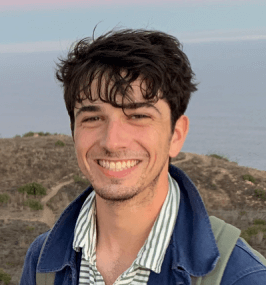‘We’re all scarred in different ways’: The next generation of Holocaust testimony
As survivors die, their descendants are finding new ways to keep their stories alive
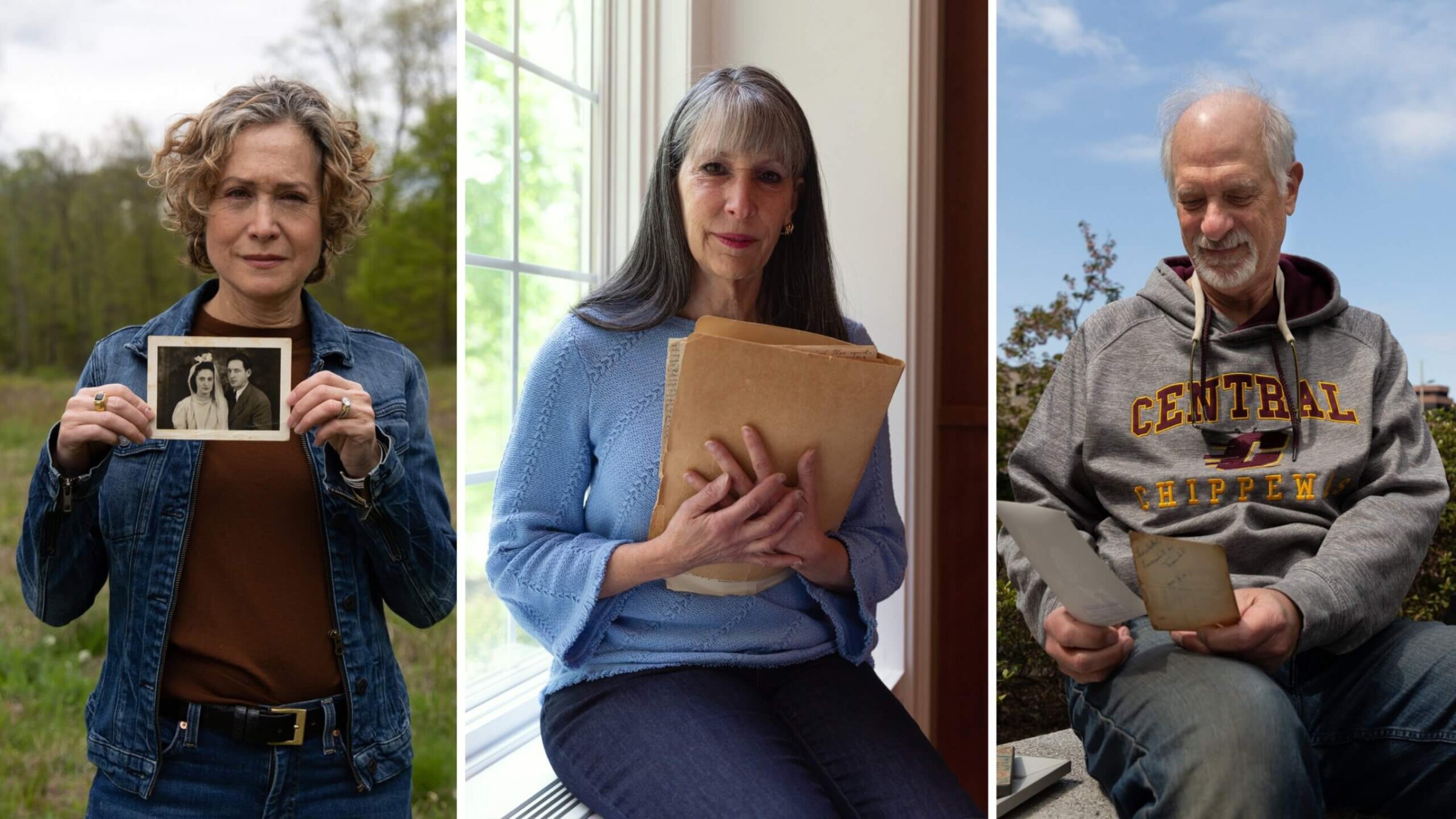
From left to right: Ziporah Janowski, Joan Poulin and Michael Gyory. Photo by Matthew Litman
YONKERS, New York — Joan Poulin paced the bima of Lincoln Park Jewish Center as she told the story. Her tone was urgent, almost severe, as she spoke to 100 teenagers about what it was like growing up in a well-off Jewish family in Hamburg, Germany, as the Nazis came to power; surviving Kristallnacht and then making the wrenching decision to leave her mother and brother behind in 1938 and flee to the United States.
“Why am I telling you this?” Poulin asked. “I want you to understand what hate can do. That you can never be silent.”
The presentation sounded like countless other Holocaust survivor testimonies, but Poulin is 66 — born long after the war, in 1957. The story she was telling was not her own but that of her father, who rarely spoke about his childhood in Europe. She pieced it together after he died in 2007 from a trove of letters he left behind in a language she did not understand; now she tells the story as often as possible.

Poulin is one of 38 members of a community called Generations Forward, descendants of survivors who excavate their families’ trauma — and their own — for the public good. Run by the Holocaust and Human Rights Education Center, founded in 1990 by local community members and survivors in Westchester, it is part of a broader movement aimed at ensuring that Holocaust education and testimony continues as the number of survivors rapidly dwindles; last year, a number of so-called third-generation — 3G — groups formed an umbrella called Living Links that is working with the USC Shoah Foundation to expand their reach.
A recent study estimated that 245,000 survivors are still living, half of them in Israel and 16% in the United States. Their median age is 86.
Since Oct. 7, amid a rise in antisemitism and accusations that Israel is committing genocide in Gaza, the Holocaust center has seen more traffic to its online curriculum and fielded more requests for speakers like Poulin, according to its executive director Millie Jasper.
“We’re all sad; we’re traumatized,” Jasper said in an interview. “We’re carrying the trauma with us.”
At Gorton High School in Yonkers, for example, the Holocaust comprises two lessons in a general history class, said Stephen Frum, a history teacher there.
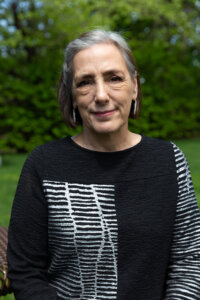
“So much is stuffed into the curriculum that it makes it impossible” to study it more, he said.
I met Frum, whose grandfather was in the U.S. Army during World War II, at Poulin’s talk at the synagogue. He had brought 40 students with him. Afterwards, he asked Poulin how to find out more about his great-grandfather, who fled Poland long before the war. Presentations like Poulin’s “make it personal” for students,” he said. “They make it real.”
Generations Forward started in 2014, and has worked with a Westchester organization called Safekeeping Stories to help Poulin and other descendants of survivors research and refine their narratives. After an intensive fact-checking process, they are listed on the center’s website as “Memory Keepers” available to speak at schools, synagogues and community centers.
Millie Jasper, the group’s executive director, said some 25,000 people have attended its talks in person or online since 2017.
‘Who’s going to tell her story if not me?’
That was the year Michael Gyory, 68, heard such a speaker on Yom Hashoah, and decided to become one. Gyory had been in the room when his mother gave her testimony as part of Steven Spielberg’s archive at the Shoah Foundation, but wanted to record all the details for his son, his seven nieces and nephews, and himself.
“To this day, I cannot tell you my grandparents’ birthdays, for instance,” said Gyory, a real estate developer who lives in Irvington, New York. “And probably only because of my research and my work and telling these stories, can I even tell you my grandparents’ first names.”
Through the Safekeeping Stories workshop, he learned about the torture his father, Tomi, endured as a 19-year-old slave laborer in Yugoslavia and the death march his mother, Zsuzsi Schvarcz, survived at 15. He also discovered that he is distant cousins with Agi Keleti, the Jewish gymnast who survived the Holocaust by hiding in Hungary and, at age 103, is the oldest living Olympian champion.
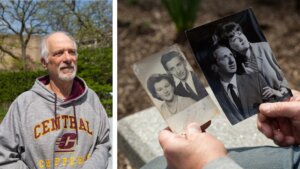
His narrative weaves this history with his own memories of growing up in woodsy Katonah, New York: his parents’ frequent apologies for his lack of aunts and uncles, his mother’s attempted suicides, and his parents’ divorce. Gyory’s father died in 1993, his mother in 2014.
“I like telling their story together; I like putting them back together,” Gyory said. “Who’s going to tell her story if not me?”
‘I became obsessed; I was looking all over’
Two years after hearing that Yom Hashoah presentation, Gyory joined the board of the Holocaust center, which is based in White Plains, New York. In 2021, he became its chair. He told me he thinks his parents would “be proud of the fact that I am telling the story of the Holocaust,” but also “appalled that I was telling family secrets.”
It’s a common conundrum for the Memory Keepers.
Sandy Speier Klein’s parents, Paula Falek and Herman Speier, mostly shielded her from their experiences of the war. As a teenager, she got bits and pieces from her mother, culminating in the revelation that Sandy had a half-brother named Manfred.
Paula was married before the war to a man named Jakob. They moved to Italy from Germany in 1938. As the Nazis came, Paula gave Manfred to a neighbor for safekeeping, but he disappeared around 1944, when he was 6. The couple was deported to Auschwitz, where they saw each other through a fence between the sex-segregated sides of the camp until one day, as Paula told Sandy, Jakob was not there. After the war, Paula met Herman, Klein’s father, in the United States and operated a chain of dry cleaners with him.
In the 1990s, when some new archives became available, Sandy pushed Paula to look for more information about Manfred.
“She said, ‘I’ve spent 50 years believing he’s dead; I can’t do this anymore,’” Sandy recalled. After her mother died in 1994, she added, “It suddenly hit me that I’m an only child. And I needed to find out what happened to my brother.”
Klein contacted Italy’s Foundation of Jewish Contemporary Documentation Center. In 2007, she retraced her mother’s journey: from Milan to Costa di Rovigo, where she met the lone surviving member of the family that took care of Manfred, Lino Guiriola.
“I became obsessed, you know, I was looking all over,” Klein told me. “At one point during my search, my husband turned to me and said, ‘How would you feel if you found him and he wanted no part of you, and he wanted no part of your mother’s history?’ And I looked at him and I said, ‘You know what? Would I be devastated? Yes. But at least I would know what happened to him.’”
She never found the full story. But Guiriola, who was also a child during the war, told Klein that one day he returned from school to find Manfred being taken away in a vehicle and his own mother lying on the floor of their house, severely beaten.
While she was in Costa di Rovigo, Klein also got a drawing of Manfred made by a neighbor who had lived across the street from the Guiriolas. She came to Safekeeping Stories with a lot of information but little confidence. As she put together the narrative, she often paused to cry.
“I’m not sure if she’d be proud of me for uncovering this, or angry at me for uncovering this because this was stuff she chose not to tell me,” Klein said of her mother. “Why was I not more compassionate? Why was I not more understanding? Why didn’t I ask these questions? Why didn’t I push for more information? Because once my mother was gone, she was gone.”
‘We’re all scarred in different ways’
Ziporah Janowski’s father, Meier, told her when she was 6 years old that he had another family before the war. His first wife and daughter, Zeesala, were murdered at Auschwitz.
“I remember being fascinated by that,” Janowski told me, “and also understanding that I was a replacement. And I don’t mean that in a pejorative or negative way. It was like a beautiful thing that my father wanted me so badly.”
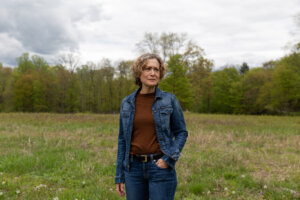
Janowski, a 65-year-old lawyer who lives in Croton-on-Hudson, New York, said the Holocaust was such a big part of her parents’ narratives that she felt like she was “born knowing.” Her mother, Chana Mosler, who survived three years as a teenager in a subcamp of the Gross Rosen concentration camp, routinely woke up in the middle of the night, screaming that dogs were chasing her. But Janowski never wanted to be identified as the child of survivors — until she did.
In 2019, when she was retiring and one of her two older brothers was dying of pancreatic cancer, she was sent an email about the Safekeeping Stories workshop.
“It just hit me that this is as good a time as any, maybe the best time, especially in a structured environment, to get that story down on paper so that my kids will have it,” she told me. “So that it wouldn’t be forgotten.”
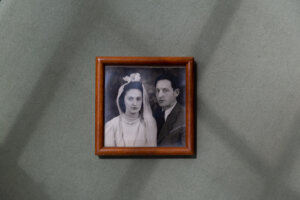
Wendy Lower, a professor at Claremont McKenna College and author of several books about the Holocaust, said it was not unusual for survivors like Klein’s and Gyory’s parents to keep the details to themselves.
“Anyone who has experienced deep trauma, it’s difficult to talk about,” she said. “There were things that adults talked about but that you didn’t share with children. And that’s what happened during the Holocaust.”
That’s certainly what happened in Poulin’s family. For most of her life, she had no idea what happened to her parents during the war. She and her brother, Steven, grew up in Flushing, Queens, overlooking a Jewish cemetery. Her father, Werner Satz, was a salesman.
“We’re all scarred in different ways,” Poulin said. “Some people had a little bit fed to them, some people had way too much fed to them. And then there’s mine, where you knew nothing.”
Dad was strict and controlling, hovering over young Joan and listening in on her phone calls with friends. Mom was loving and easygoing, but also quiet. Neither entertained questions about their pasts and Poulin knew not to ask.
“You weren’t allowed to,” she told me. “They kept these things hidden away in a box.”
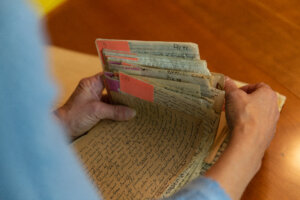
She meant it literally.
Poulin’s father’s story was kept across the hall from her childhood bedroom in a stack of 175 letters in a drawer in his nightstand. The letters were written on sheets of onion skin or brittle paper in various sizes, filled edge to edge with long, winding black cursive in a language she could not understand.
As a child, she would sometimes ask her father about the letters. But it was too painful.
“I said to him, ‘Here, read something to me, tell me what it says,’” she recalled. “And he got as far as the salutation.”
‘Günther is no longer here with me’
It was decades later, after her father died in 2007, that Poulin rediscovered the bundle of letters, along with photographs and other documents, in the nightstand. Another 10 years passed before she had them professionally translated, a process that took another year and a half.
The letters were in Sütterlin, a now-defunct German script banned by the Nazi Party in 1941. More than half of the work was done by a lone translator who still knew the script.
What Poulin discovered was one side of a yearslong correspondence between her father, who had emigrated to America after Kristallnacht in 1938, and his mother, Selma, and younger brother, Günther, who stayed behind in Hamburg. They were relying on Werner, who was 23, to help them navigate the bureaucracies of both Nazi Germany and the United States so they could emigrate and join him.
“I tried everything that was possible,” Selma wrote in 1941, when Germany had effectively closed the exit doors. “But now everything is hopeless, and what that means for us isn’t pretty.”
In another letter, Günther vents to his brother, “Mutti always talks and talks but absolutely nothing gets done,” he said, using a Germanic term of endearment for mom. “I don’t hold out a lot of hope, but we have to wait and see.”
Poulin discovered that her uncle was deported to the Minsk ghetto on Nov. 8, 1941. Selma’s letter two days later is her last in the box. “Günther is no longer here with me,” she wrote. “Günther still wanted to write you, but he was no longer able to get to it. He’s sending you love.”
Selma was deported to Auschwitz on July 11, 1942, Poulin discovered from Nazi deportation lists, and sent to the gas chambers upon arrival. She was 58.
Poulin still is not sure what happened to her uncle Günther.

“I understand why it was very painful for him,” she said of her father, “and he probably didn’t want to burden us with any of this. But for God’s sake, we’re Jews; we should know. For him not to say anything for all those years, I resent that.”
“I mourn him twice,” Poulin said. “For the father he could have been and for the father that he was.”
‘There’s no one to forgive’
After more than an hour speaking to students at the Lincoln Park Jewish Center, Poulin asked if there were any questions.
Speaking to students about the Holocaust is a balancing act, trying to be a historian, teacher and proxy for one of the world’s greatest horrors all at once. What do they know? How much to reveal? Are they even paying attention?
A young girl raised her hand and asked whether Poulin thought it was better to forgive and forget or to never forgive and never forget. Poulin was adamant that we should never forget. But forgive?
“It’s not like I can meet the person who put my grandmother in a gas chamber,” Poulin said. “There’s no one to forgive.”
